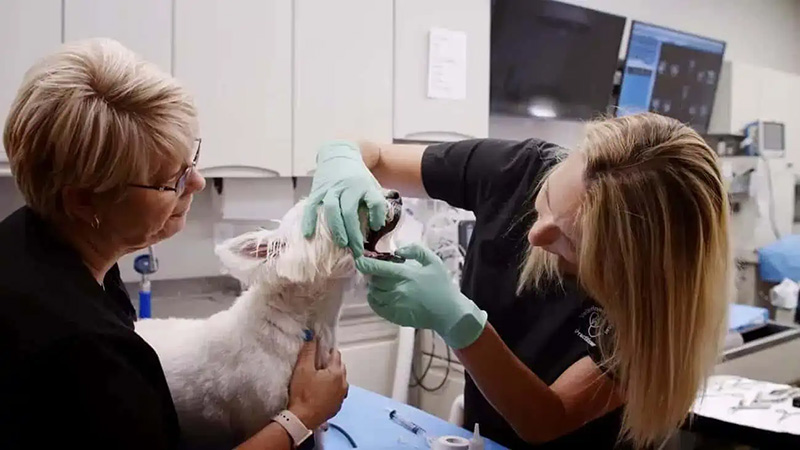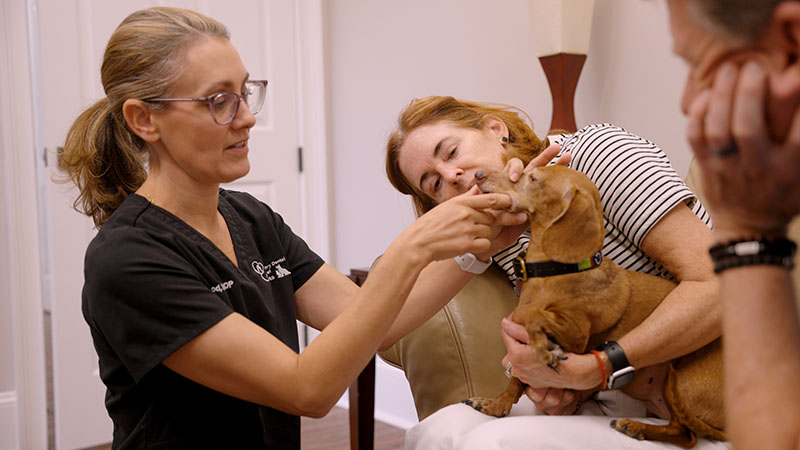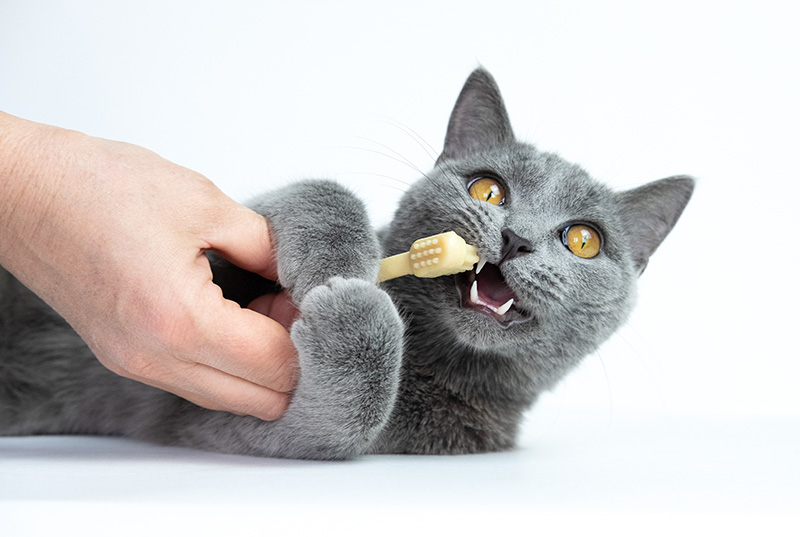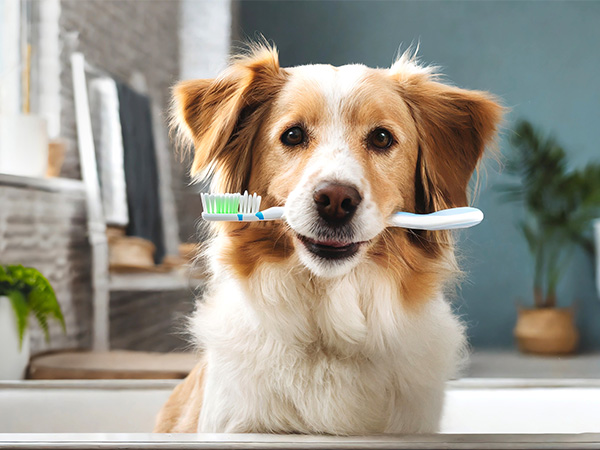Many pet owners don’t realize how important dental health is for their furry family members, even though it plays a significant role in their overall well-being. Sadly, some common misconceptions about pet oral care can lead to preventable dental issues. These myths can cause problems like infections and tooth loss and even affect other organs. In this blog, we’ll help clear up some of the most common dental care myths and share helpful, reliable tips to keep your furry friend’s teeth healthy and strong!
Myth #1: Pets Don’t Need Dental Care Similar to Humans
Reality: Like humans, pets develop plaque and tartar, which, if untreated, can lead to gum, bone, and tooth disease. Neglected oral health can cause infections and spread bacteria into the bloodstream, risking their overall health, well-being, and longevity.
Takeaway: Preventive care—regular brushing and other forms of dental home care, dental checkups, and professional dental care under general anesthesia — are important to help keep your cats’ and dogs’ teeth and gums healthy.
Myth #2: Strong or Foul Pet Breath is Normal with Age
Reality: A consistently off or foul smell in your pets mouth is more likely due to underlying oral issues, like gum disease, plaque buildup, an infection, and in some cases oral masses.
Takeaway: If you notice persistent bad breath, schedule a veterinary dental cleaning, ass to pinpoint and resolve any potential problems quickly.
Myth #3: Dry Kibble Automatically Cleans Teeth
Reality: Kibble may remove food particles, but it doesn’t clean teeth. Plaque—a sticky biofilm—clings to teeth and needs brushing to remove. Within 24 hours, it returns and, if left unchecked, hardens into tartar, which only professional cleaning can remove. Like people, pets need proper dental care beyond diet to keep their teeth healthy.
Takeaway: Brushing with pet-safe toothpaste, offering specialized dental chews, and arranging professional cleanings are all key to removing plaque and minimizing tartar, keeping teeth and gums healthy.

Myth #4: Bones and Chew Toys Alone Suffice for Good Oral Health
Reality: Certain chew products can help lower plaque levels, but they don’t eliminate the need for brushing or routine dental evaluations. In some cases, bones can cause fractured teeth or become choking hazards.
Takeaway: Various dental care products are available for pets, such as toothpaste and toothbrushes designed for pets, dental chews, mouthwashes, dental sealants, water supplements, and dental diets. But nothing replaces regular brushing and professional vet assessments to keep your pet’s mouth in peak shape.
Myth #5: Pets Naturally Clean Their Own Teeth Just Like Wild Animals
Reality: Household pets rely on processed foods and lead different lifestyles than their wild relatives. Consequently, they lose out on many natural behaviors that help cleanse teeth in the wild.
Takeaway: Because of differences in diet and environment, domestic pets need a consistent dental care regimen, including brushing and professional cleanings.
Myth #6: Eating Normally Means a Pet’s Teeth Are Fine
Reality: Dental disease can cause significant oral pain in pets, but detecting it can be difficult since dogs and cats instinctively hide discomfort. They may continue eating and behaving normally, even with advanced issues like inflamed gums, infections, or loose teeth. Subtle signs, such as bad breath, drooling, pawing at the mouth, or changes in chewing habits, might be the only indicators of underlying pain.
Takeaway: Routine oral exam scheduling is crucial for detecting hidden conditions and ensuring treatment before problems escalate. The Veterinary Dental Center of Atlanta has experienced veterinarians who are familiar with dental diseases.
Myth #7: Anesthesia-Free Dental Procedures Are Safer
Reality: Anesthesia is necessary to obtain X-rays of your pet’s mouth. Anesthesia-free cleanings remove surface plaque above the gumline but do not remove tarter or address deeper concerns beneath the gumline. Examining and treating underlying dental diseases without proper sedation is riskier for your pet and veterinarian.
Takeaway: Anesthesia is essential for safe and thorough dental cleaning, ensuring your pet stays still, pain-free, and receives comprehensive care. At the Veterinary Dental Center of Atlanta, our experienced team prioritizes your furry friend’s comfort. It provides the best anesthesia care for your pet, making the procedure stress-free for you and your beloved pet.

Myth #8: Home Remedies Can Replace Professional Dental Treatments
Reality: While a few remedies may offer temporary freshening, they can’t address gum disease at its roots. In some cases, unverified treatments can harm your pet’s health.
Takeaway: Consult your veterinarian for approved dental products and procedures. Professional supervision is the safest way to maintain optimal oral health.
Myth #9: Brushing a Pet’s Teeth Isn’t Necessary
Reality: Brushing remains the most effective strategy to eliminate plaque and discourage tartar formation.
Takeaway: Brushing should be part of your daily or weekly routine, and use toothpaste designed specifically for pets to safeguard their oral health.

Myth #10: Puppies and Kittens Don’t Need Dental Attention
Reality: Introducing tooth brushing early helps puppies and kittens develop positive habits and reduces the risk of dental issues later in life. Regular dental checkups also allow for early detection of jaw or tooth alignment problems that could lead to more serious complications.
Takeaway: Begin brushing as soon as possible so your young pet adapts to the routine and reaps the rewards of consistent dental maintenance for life. Ask your veterinarian for a dental check-up to ensure proper bite alignment and tooth structure.

